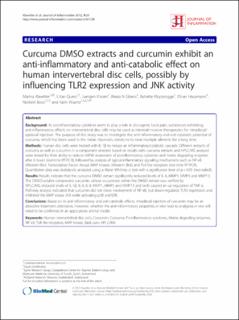Bitte benutzen Sie diese Kennung, um auf die Ressource zu verweisen:
https://doi.org/10.21256/zhaw-4871| Publikationstyp: | Beitrag in wissenschaftlicher Zeitschrift |
| Art der Begutachtung: | Peer review (Publikation) |
| Titel: | Curcuma DMSO extracts and curcumin exhibit an anti-inflammatory and anti-catabolic effect on human intervertebral disc cells, possibly by influencing TLR2 expression and JNK activity |
| Autor/-in: | Klawitter, Marina Quero, Lilian Klasen, Juergen Gloess, Alexia N. Klopprogge, Babette Hausmann, Oliver Boos, Norbert Wuertz, Karin |
| DOI: | 10.21256/zhaw-4871 10.1186/1476-9255-9-29 |
| Erschienen in: | Journal of Inflammation |
| Band(Heft): | 9 |
| Heft: | 29 |
| Erscheinungsdatum: | 2012 |
| Verlag / Hrsg. Institution: | BioMed Central |
| ISSN: | 1476-9255 |
| Sprache: | Englisch |
| Fachgebiet (DDC): | 580: Pflanzen (Botanik) 610: Medizin und Gesundheit |
| Zusammenfassung: | Background: As proinflammatory cytokines seem to play a role in discogenic back pain, substances exhibiting anti-inflammatory effects on intervertebral disc cells may be used as minimal-invasive therapeutics for intradiscal/epidural injection. The purpose of this study was to investigate the anti-inflammatory and anti-catabolic potential of curcuma, which has been used in the Indian Ayurvedic medicine to treat multiple ailments for a long time. Methods: Human disc cells were treated with IL-1β to induce an inflammatory/catabolic cascade. Different extracts of curcuma as well as curcumin (= a component selected based on results with curcuma extracts and HPLC/MS analysis) were tested for their ability to reduce mRNA expression of proinflammatory cytokines and matrix degrading enzymes after 6 hours (real-time RT-PCR), followed by analysis of typical inflammatory signaling mechanisms such as NF-κB (Western Blot, Transcription Factor Assay), MAP kinases (Western Blot) and Toll-like receptors (real-time RT-PCR). Quantitative data was statistically analyzed using a Mann Whitney U test with a significance level of p < 0.05 (two-tailed). Results: Results indicate that the curcuma DMSO extract significantly reduced levels of IL-6, MMP1, MMP3 and MMP13. The DMSO-soluble component curcumin, whose occurrence within the DMSO extract was verified by HPLC/MS, reduced levels of IL-1β, IL-6, IL-8, MMP1, MMP3 and MMP13 and both caused an up-regulation of TNF-α. Pathway analysis indicated that curcumin did not show involvement of NF-κB, but down-regulated TLR2 expression and inhibited the MAP kinase JNK while activating p38 and ERK. Conclusions: Based on its anti-inflammatory and anti-catabolic effects, intradiscal injection of curcumin may be an attractive treatment alternative. However, whether the anti-inflammatory properties in vitro lead to analgesia in vivo will need to be confirmed in an appropriate animal model. |
| URI: | https://digitalcollection.zhaw.ch/handle/11475/12905 |
| Volltext Version: | Publizierte Version |
| Lizenz (gemäss Verlagsvertrag): | CC BY 2.0: Namensnennung 2.0 Generic |
| Departement: | Life Sciences und Facility Management |
| Organisationseinheit: | Institut für Chemie und Biotechnologie (ICBT) |
| Enthalten in den Sammlungen: | Publikationen Life Sciences und Facility Management |
Dateien zu dieser Ressource:
| Datei | Beschreibung | Größe | Format | |
|---|---|---|---|---|
| Klawitter2012_Article_CurcumaDMSOExtractsAndCurcumin.pdf | 1.31 MB | Adobe PDF |  Öffnen/Anzeigen |
Zur Langanzeige
Klawitter, M., Quero, L., Klasen, J., Gloess, A. N., Klopprogge, B., Hausmann, O., Boos, N., & Wuertz, K. (2012). Curcuma DMSO extracts and curcumin exhibit an anti-inflammatory and anti-catabolic effect on human intervertebral disc cells, possibly by influencing TLR2 expression and JNK activity. Journal of Inflammation, 9(29). https://doi.org/10.21256/zhaw-4871
Klawitter, M. et al. (2012) ‘Curcuma DMSO extracts and curcumin exhibit an anti-inflammatory and anti-catabolic effect on human intervertebral disc cells, possibly by influencing TLR2 expression and JNK activity’, Journal of Inflammation, 9(29). Available at: https://doi.org/10.21256/zhaw-4871.
M. Klawitter et al., “Curcuma DMSO extracts and curcumin exhibit an anti-inflammatory and anti-catabolic effect on human intervertebral disc cells, possibly by influencing TLR2 expression and JNK activity,” Journal of Inflammation, vol. 9, no. 29, 2012, doi: 10.21256/zhaw-4871.
KLAWITTER, Marina, Lilian QUERO, Juergen KLASEN, Alexia N. GLOESS, Babette KLOPPROGGE, Oliver HAUSMANN, Norbert BOOS und Karin WUERTZ, 2012. Curcuma DMSO extracts and curcumin exhibit an anti-inflammatory and anti-catabolic effect on human intervertebral disc cells, possibly by influencing TLR2 expression and JNK activity. Journal of Inflammation. 2012. Bd. 9, Nr. 29. DOI 10.21256/zhaw-4871
Klawitter, Marina, Lilian Quero, Juergen Klasen, Alexia N. Gloess, Babette Klopprogge, Oliver Hausmann, Norbert Boos, and Karin Wuertz. 2012. “Curcuma DMSO Extracts and Curcumin Exhibit an Anti-Inflammatory and Anti-Catabolic Effect on Human Intervertebral Disc Cells, Possibly by Influencing TLR2 Expression and JNK Activity.” Journal of Inflammation 9 (29). https://doi.org/10.21256/zhaw-4871.
Klawitter, Marina, et al. “Curcuma DMSO Extracts and Curcumin Exhibit an Anti-Inflammatory and Anti-Catabolic Effect on Human Intervertebral Disc Cells, Possibly by Influencing TLR2 Expression and JNK Activity.” Journal of Inflammation, vol. 9, no. 29, 2012, https://doi.org/10.21256/zhaw-4871.
Alle Ressourcen in diesem Repository sind urheberrechtlich geschützt, soweit nicht anderweitig angezeigt.